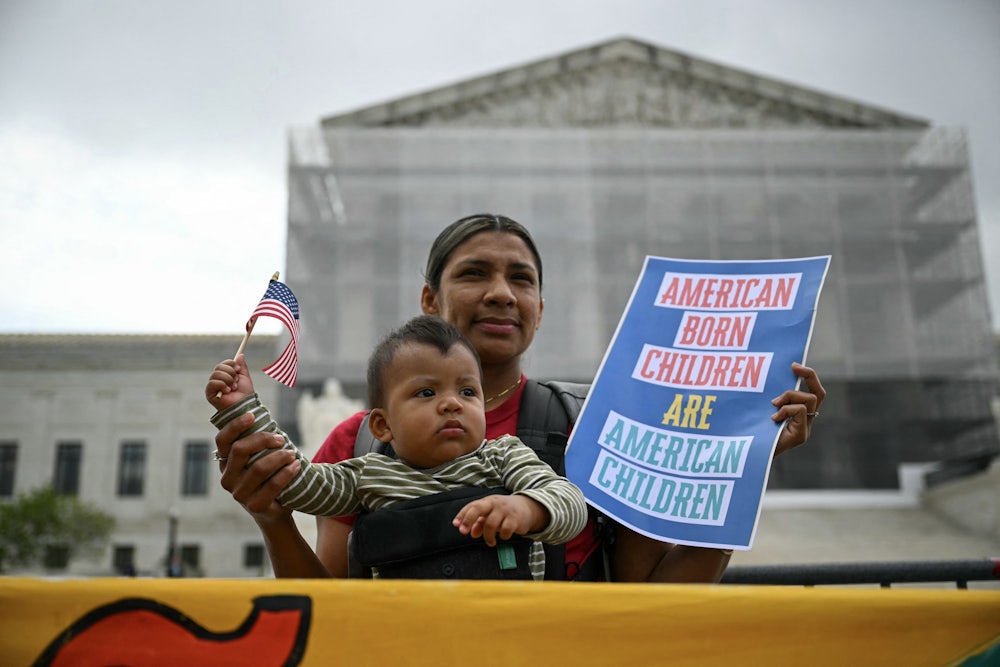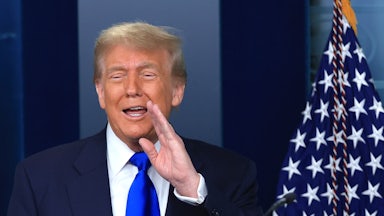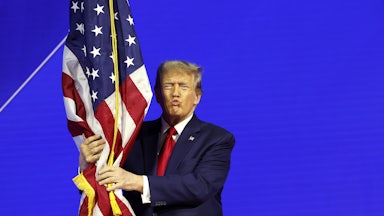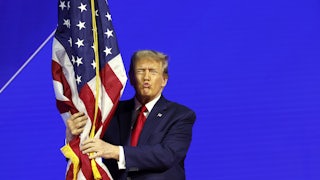The Trump administration recently asked the Supreme Court to review two lower court rulings that struck down its executive order on birthright citizenship. This is not in and of itself surprising. What stands out about this case is not just the legal arguments themselves but how a small group of legal academics have tried to create a dubious counter-consensus around the citizenship clause to further Trump’s goals.
The citizenship clause reads as follows: “All persons born or naturalized in the United States, and subject to the jurisdiction thereof, are citizens of the United States and of the State wherein they reside.” This language is both broad and unequivocal. It was designed to eliminate any ambiguity or uncertainty about the status of American citizenship, for both the formerly enslaved people living in the South and for untold generations to come.
By its own text, the clause has only one exception. People who are not “subject to the jurisdiction” of the United States do not automatically acquire U.S. citizenship at birth. Who qualifies for disqualification? A person is subject to the jurisdiction of the United States when they are on American soil. They can be taxed, regulated, searched, seized, arrested, tried, convicted, imprisoned, pardoned, and so on. When a person crosses the border into Canada, on the other hand, they are subject to the jurisdiction of Canada and everything that change entails.
There were two well-known exceptions at the time of the Fourteenth Amendment’s enactment. Members of Native American tribes not under U.S. jurisdiction did not acquire U.S. citizenship at birth because of the unique status that tribal nations, as distinct sovereign entities, had in the American constitutional framework. This exception is no longer operative because Congress granted citizenship by statute to all Native Americans born on U.S. soil with the Indian Citizenship Act of 1924.
The other exception, which still exists, is for children of foreign diplomats born on U.S. soil. Their exclusion is largely for pragmatic reasons. For one thing, the child’s parents have diplomatic immunity and are therefore not “subject to the jurisdiction” of the United States. For some countries, acquiring American citizenship at birth could endanger the child’s citizenship in their parents’ native land. Even the United States did not fully recognize dual citizens until the 1970s.
The diplomatic exception is fairly obscure nowadays but still carries legal force. In August, the Ninth Circuit Court of Appeals ruled that 75-year-old Roberto Moncada was not a U.S. citizen despite being born in New York City in 1950. U.S. officials mistakenly believed that Moncada’s father, a Nicaraguan diplomatic official at the United Nations at the time, did not have diplomatic immunity when he served in the country. When Moncada renewed his passport for a fifth time in 2018, the federal government discovered the error and denied his application.
Beyond that, the citizenship clause’s meaning has been settled since the late nineteenth century. The Supreme Court ruled in the 1898 case Wong Kim Ark v. United States that a San Francisco–born man had automatically acquired U.S. citizenship at birth, even though his parents were Chinese nationals. Subsequent changes to federal immigration law did not change this consensus because the Constitution supersedes federal law.
Occasional fringe voices tried to argue otherwise over the past 30 years, but a broad assortment of legal scholars have defended the status quo. They include more liberal legal scholars like Garrett Epps, as well as rock-ribbed originalists like Michael Ramsey and James Ho, the latter of whom was appointed by Trump to serve on the Fifth Circuit Court of Appeals.
This has not stopped the Trump administration from claiming that it is restoring what it described as “the [Citizenship] Clause’s original meaning.” It effectively argued that the legislative, executive, and judicial branches had all misread both the clause and Wong Kim Ark for the past century or more. “Long after the Clause’s adoption, the mistaken view that birth on U.S. territory confers citizenship on anyone subject to the regulatory reach of U.S. law became pervasive, with destructive consequences,” the Justice Department claimed.
It is not uncommon for legal briefs to cite legal scholarship to support their arguments. While law professors cannot make law, they can refine and clarify the legal system’s understanding of the law. This has led some judges to lament that the legal academy’s writings aren’t more relevant to their jobs. “Pick up a copy of any law review that you see, and the first article is likely to be, you know, the influence of Immanuel Kant on evidentiary approaches in 18th century Bulgaria or something,” Chief Justice John Roberts once remarked.
The birthright citizenship cases reverse this trend, perhaps a little too aggressively. “A growing body of modern scholarship reinforces those views,” the Justice Department claimed. It exclusively cited writings by law professors published after the executive order was issued that generally seek to defend it outright or to at least attack those who criticize it and suggest the matter is more ambiguous than everyone thought. That, in turn, would invite the Supreme Court to “clarify” matters.
One such effort is by Ilan Wurman, a conservative law professor at the University of Minnesota. His initial foray into the matter was a New York Times column, co-signed with legal scholar Randy Barnett, titled “Trump Might Have a Case on Birthright Citizenship.” Its goal was fairly clear. “When they finally consider this question, the justices will find that the case for Mr. Trump’s order is stronger than his critics realize,” they argued.
The two men advanced what they called the “allegiance-for-protection theory” to claim that “subject to the jurisdiction” didn’t actually mean “subject to the jurisdiction” as someone would normally understand it. “Both the Lincoln administration and the Congress that proposed the Fourteenth Amendment held this allegiance-for-protection view, with this difference: In England, the allegiance expected of a subject was obedience to the sovereign monarch in return for his protection,” they claimed. “In the American Republic, where the people are sovereign, the allegiance expected of a citizen was obedience to the laws.”
Wurman received widespread criticism for the column, which prompted him to expand on his argument in a 93-page research paper. (Barnett did not join him in this subsequent endeavor.) It covers a breathtaking range of historical sources: a 1608 case by Lord Coke on whether Scottish people born after the Stuarts inherited the English throne were English subjects, safe-passage charters for medieval merchants, freedom suits by enslaved Black Americans before the Civil War, some international law treatises, a few other obscure cases, and so on. One gets the impression that Wurman is trying to bury his opponents through sheer volume.
His conclusion, after this grand survey, is still that Trump may be right after all. “The best reading of the historical evidence is that the clause extended birthright citizenship to children born of parents subject to the complete municipal jurisdiction of the United States,” Wurman claimed. “Under the law of nations, certain categories of individuals could be physically present in a territory but subject to the law of nations rather than to the municipal power of the local sovereign.” (In this context municipal means “domestic” instead of “city.”)
This is a familiar manifestation of originalism, where some ancient principle is asserted that dates back to the Norman Conquest or Magna Carta or whatnot. It has somehow survived intact to be imported into the American constitutional order, despite all the revolutions and civil wars and independence movements since then, where it conveniently resolves a dispute that only began a few months ago.
There is no strong evidence that this is what the Fourteenth Amendment’s drafters had in mind when they wrote the citizenship clause—which, by definition, was meant to establish a new legal and constitutional paradigm. They sought to overturn Dred Scott, which held that people of African descent could never become citizens, and protect the newly freed people in the South from discriminatory laws and practices. Law professors Evan Bernick, Paul Gowder, and Anthony Michael Kreis pointed out in a rebuttal of Wurman and others echoing his argument in July that this entire exercise took us far afield of the Fourteenth Amendment’s context and circumstances.
“Perhaps the most damning demerit of consensual accounts it is that they struggle to explain how the Citizenship Clause can perform the most basic function that everyone agrees that it must perform: the nullification of Dred Scott v. Sandford,” they wrote. “Indeed, it gives us a theory of citizenship that resembles that which led the Dred Scott majority to conclude that Black people could never become citizens of the United States.” After all, people brought to the United States in chains by force could hardly consent to being subject to the nation’s laws—nor were they granted any meaningful kind of “protection” by the laws.
Two other legal scholars cited by the Trump administration, Samuel Estreicher and Rudra Reddy, took a similar but different tack. Rather than construct a holistic alternative understanding of American citizenship, they sought instead to redefine the debate by describing the existing consensus as “the expansive view.” Though they do not defend the executive order per se, they eagerly criticize its critics. “A torrent of criticism has come from law school professors, with several competing to condemn the order in the harshest terms,” they remarked in their introduction.
To their credit, the two scholars tried harder to reconcile the aspirations of the Fourteenth Amendment’s drafters with the cold reality of what Trump was proposing. “The congressional record reflects a group of principled and motivated legislators trying to atone for the depredations of slavery by constitutionalizing the rights of citizenship for freed slaves,” they wrote. “There is little to suggest by way of text, history, or precedent that this grace extends to children of persons who have entered and reside in the U.S. in disregard of its laws.”
It is true that the debates for the Fourteenth Amendment make no direct mention of illegal immigration, in large part because the concept didn’t exist at that time. The United States had essentially open borders for most of its early history, with the first broadly restrictive laws—targeting Chinese immigrants in California and the Pacific states—not enacted until after the Fourteenth Amendment’s ratification. Even then, the citizenship clause superseded those laws: Wong Kim Ark, the man behind the 1898 case, brought the lawsuit after customs officials had denied him entry under the Chinese Exclusion Acts.
Other efforts to find ways around the Fourteenth Amendment’s clear text, design, and intent face similar difficulties. The Trump administration also cited a legal essay by University of Richmond law professor Kurt Lash published earlier this year: “Although often described as establishing ‘birthright citizenship,’ in fact, birth on American soil by itself confers no such right. One must be born on American soil and be ‘subject to the jurisdiction of the United States.’
“This approach, which I call ‘prima facie citizenship,’ grants presumptive citizenship to any person born in the United States,” he explained. “This presumption can be defeated only if there is positive evidence that the person was born in a familial context of refused or counter allegiance to the United States.”
I will not bother to repeat how, unless you are the child of a foreign diplomat, there is no such difference in practical terms today. Instead it is sufficient to point out how he justified this conclusion. Lash, Wurman, and others argue that the citizenship clause did not represent some breach from the past but rather a continuity with it, and that it “brought the old soil,” so to speak, with it when the Fourteenth Amendment was ratified. That old soil, in this case, was an 1862 report by Attorney General Edwin Bates titled “On Citizenship,” where he addressed the citizenship of freed Black sailors who sought to command vessels.
In every civilized country the individual is born to duties and rights—the duty of allegiance and the right to protection; and these are correlative obligations, the one the price of the other, and they constitute the all sufficient bond of union between the individual and his country, and the country he is born in is, prima facie, his country. In most countries the old law was broadly laid down that this natural connection between the individual and his native country was perpetual; at least, that the tie was indissoluble by the act of the subject alone.
I will set aside the preposterousness of holding that an attorney general’s opinion from 1862 carries more weight than the clear command of the citizenship clause enacted and ratified seven years later. As Bernick, Gowder, and Kreis point out, this interpretation doesn’t even work on its own terms because the attorney general himself explained that the threshold is nearly insurmountable.
“Bates identifies only one kind of exception to the general rule of birthright citizenship: ‘the small and admitted class of the natural born composed of the children of foreign ministers and the like,’” they noted. Bates, for the record, also concluded that the sailors in question were citizens by simple virtue of being born in the United States, Dred Scott be damned.
Will these various arguments work? It depends on whether the justices agree with them. This is a matter of justification, not persuasion or investigation. If you asked me 10 years ago whether the Supreme Court would eliminate birthright citizenship, I would have said there wasn’t a chance in hell. If you asked me five years ago, I would have confidently thought that a supermajority of justices would uphold it.
After all the constitutional tumult of the last 18 to 24 months, I am much less certain that the court will refuse to allow Trump to unilaterally rewrite the terms of American citizenship if and when it takes up these cases. The Justice Department asked for review before the federal appeals courts could weigh in, which the court might not grant for non-merits reasons.
Trump’s executive order proved that the Fourteenth Amendment’s drafters were correct to make an absolute rule for citizenship. I am still optimistic enough to hope, however, that the justices will not be fooled by such a transparent effort to muddy what should be crystal clear—or ignore the immense harm it would do to the nation if followed.










